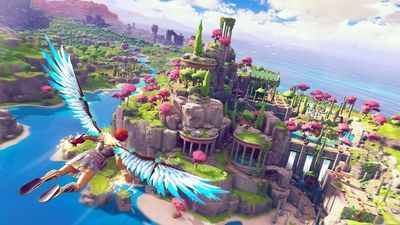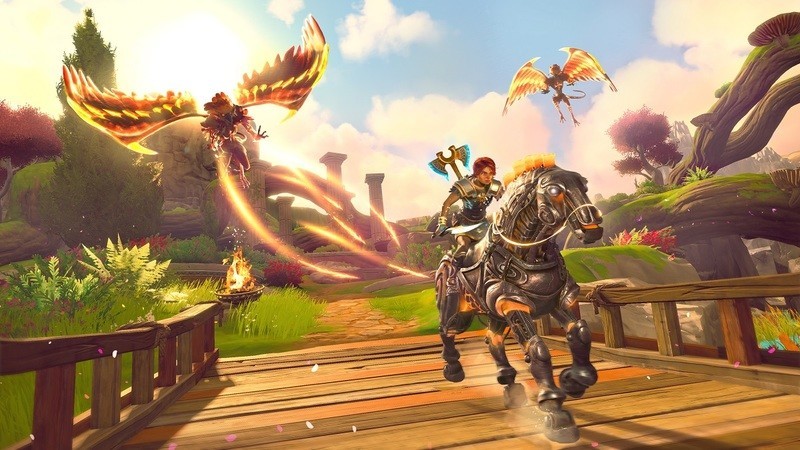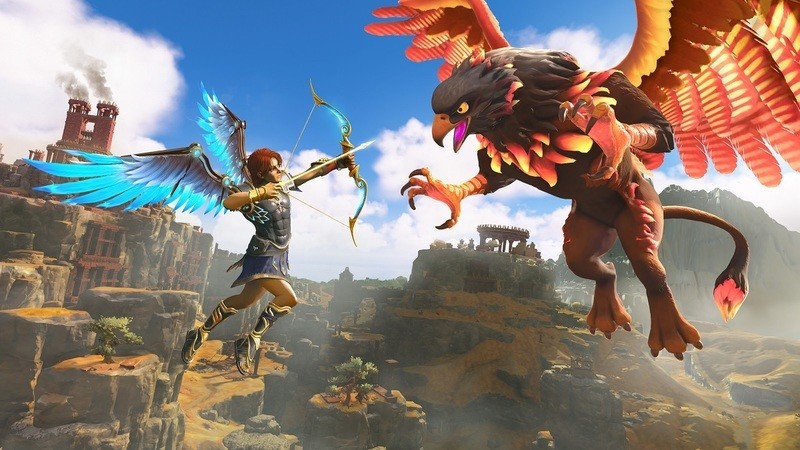Immortals Fenyx Rising Wants to Keep Gamers Busy Over the Holidays

When is an open-world game too open? Journeying through the world of Ubisoft’s “Immortals Fenyx Rising,” now available on next-gen consoles and the last generation, leads to a sense of open exploration that’s tempered by a lack of direction. There’s always something to do in this game, from major and minor story missions to the dozens of side adventures to be found littered across the landscape, but it feels more like gathering things from a landscape instead of driving across it. “Fenyx Rising” really walks that line between feeling like it’s giving the player authorship and having so little focus that it’s frustrating. It’s a balance that the “Assassin’s Creed” games (a clear model here) have perfected in their best iterations, but no one wants to feel like they’re wasting time with busy work when we all have so little of it to play video games in the first place.
The structural inconsistencies end up draining too much of the momentum in terms of storytelling. There are fun sections of “Fenyx Rising” where it reaches the classic games that it’s clearly imitating—enough to justify a playthrough for those who like those inspirations—but I kept hoping it would come together into something more consistently enjoyable. Admittedly, I’m writing this only about a dozen hours into the game—so take that for what it’s worth—but with so many major games this season like “Spider-Man: Miles Morales,” “Assassin’s Creed: Valhalla,” “Call of Duty: Black Ops Civil War,” and “Cyberpunk 2077” (watch for that review before the end of the year), this one could have a tough time standing out.
“Immortals Fenyx Rising” is a cross between the widely acknowledged modern classic “Legend of Zelda: Breath of the Wild” and one of the better recent sequels, “Assassin’s Creed Odyssey.” It’s an open-world adventure game with puzzle-solving vaults like “Zelda,” that uses the templates of Greek mythology like “Odyssey.” It opens with a wager of the Gods. Typhon has escaped imprisonment by Zeus, who goes to Prometheus to help. Prometheus uses foresight to tell the story of Fenyx, an average Greek soldier who is the only survivor of a shipwreck. Prometheus and Zeus narrate the entire story of “Fenyx Rising,” and some of it is surprisingly clever and funny. They poke fun at the very mythology and concepts on which the game relies, allowing the game to be more playful than self-serious.

Fenyx, who can be very customized by gender and appearance at the beginning of the game and changed at any point during it, arrives on the Golden Isle with little direction. He sees a young man being attacked, and saves him, learning that it’s Hermes, who basically becomes the in-game guide for Fenyx. He tells him that Typhon is growing in power and that Fenyx has to now restore the Gods who once ruled this land: Aphrodite, Ares, Hephaistos, and Athena. Other classic characters form Greek mythology will play roles in the narrative, including Achilles, Atalanta, Herakles, and Odysseus. And familiar creatures dot the landscape like the Minotaur and Cyclops.
Now, it should be noted that this game doesn’t merely share world-building with “Assassin’s Creed Odyssey”—it was developed by the same team at Ubisoft Quebec (and it openly acknowledges the similarities not just in storytelling but some gameplay—you climb statues to open the sections of the map just like the synchronizing in “AC,” for example). Once called “Gods and Monsters,” and reportedly changed in part because of a trademark dispute with Monster Energy, lead writer Jeffrey Yohalem has cited “The Princess Bride,” “The Naked Gun,” and “Robin Hood: Men in Tights” as inspirations, believe it or not. The game has a very tongue-in-cheek approach to storytelling, and the voice work is strong in delivering it. It’s often fun to play a major game that is willing to be goofy and satirical, especially in an era when every game feels like intense melodrama.
The problem is that the creativity of “Fenyx Rising” is often dulled by the repetition. It’s not a game you explore as much as run from pinpoint to pinpoint. Open map, find point, go there, repeat. And a depressing amount of the large universe of this game starts to feel the same. You can run hundreds of meters from point to point for a fetch quest and not even encounter a new creature or even part of the environment. The world-building here is too thin, especially compared to the ingenious design of “Odyssey” and “Breath of the Wild.”

The RPG elements here can also sometimes feel like a chore. You will craft a lot of potions, upgrade multiple skill trees, learn so many combat techniques that you’ll never use, and so on. There’s a lot of management in “Fenyx Rising,” which is typical for the genre, but deflates some of the momentum and comic tone of the experience. Again, it’s a game that feels at its best when it’s displaying the voice of its writer and less so when you’re left alone to wander it. The best open-world games match a strong narrative voice with decisions made by the player (“Ghost of Tsushima” being a stunning example). This doesn’t always do that.
However, “Fenyx Rising” is often just fun enough to keep you going. There are “vaults” that are basically puzzle-solving games that can go on for some time and are easy to get lost in. And the constantly upgrading combat system does keep combat relatively fresh as Fenyx gets more and more powerful. The truth is that “Immortals: Fenyx Rising” has trouble escaping its influences, but you’ll have some fun running around in the shadows of the Gaming Gods.
A review copy of this game was provided by Ubisoft.





